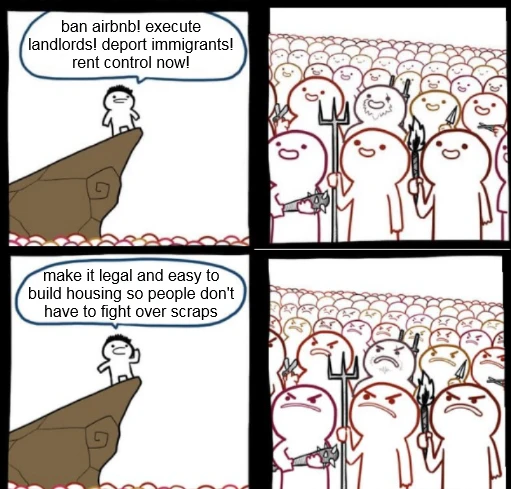this post was submitted on 26 Oct 2024
268 points (81.9% liked)
Political Memes
9328 readers
1515 users here now
Welcome to politcal memes!
These are our rules:
Be civil
Jokes are okay, but don’t intentionally harass or disturb any member of our community. Sexism, racism and bigotry are not allowed. Good faith argumentation only. No posts discouraging people to vote or shaming people for voting.
No misinformation
Don’t post any intentional misinformation. When asked by mods, provide sources for any claims you make.
Posts should be memes
Random pictures do not qualify as memes. Relevance to politics is required.
No bots, spam or self-promotion
Follow instance rules, ask for your bot to be allowed on this community.
No AI generated content.
Content posted must not be created by AI with the intent to mimic the style of existing images
founded 2 years ago
MODERATORS
you are viewing a single comment's thread
view the rest of the comments
view the rest of the comments

As an architectural professional, this misses the point. It's as easy as it's ever been to buy a plot of farmland for relative pennies vaguely near a major metro and throw up a cookie-cutter exurban subdivision full of builder-grade single-family homes. The cost has gone up due to inflation, but if anything bureaucratic and administrative expenses have dropped as a percentage of the overall cost. Builders are constantly fighting new code provisions that would increase costs, but on average most new code revisions add something on the order of a couple thousand dollars of cost to the average new home -- basically nothing against the current average sales price. Most of the cost in a new home is materials and (espescially) contractor labor and profit -- if builders want to offer cheaper standard homes, they ultimately will have to reduce their own cut.
What people are actually talking about when this comes up, is building denser housing closer in. Local zoning regulations often explicitly prohibit multi-family housing in large swathes of cities, especially the kinds most desired by families (townhomes and multiplexes, rather than large apartment complexes). It's easier to build less expensive housing closer to where people want to live, if it can be made legal to build new, middle-density homes where more density is in demand, and even to convert large single-family properties into livable duplexes (such as can be found in cities like Boston and Seattle).
There are other initiatives that I'm more ambivalent about -- for example, the push to change the building code to permit single-stair apartment buildings, that @jonne@infosec.pub mentions below. This would put American building practice more in alignment with European practice, but I am personally of the opinion that the requirement in US codes for multiple means of egress is one of the most significant safety improvements we've made, and single-stair towers, in combination with the related design philosophy for residents to shelter in place during a fire, was one of the largest contributors to tragedies like Grenfell. But the advocates do have a point that egress requirements do dramatically reduce the efficiency of the typical apartment tower floorplate in the US, and there is probably a way to balance out the risk with other fire protection features.